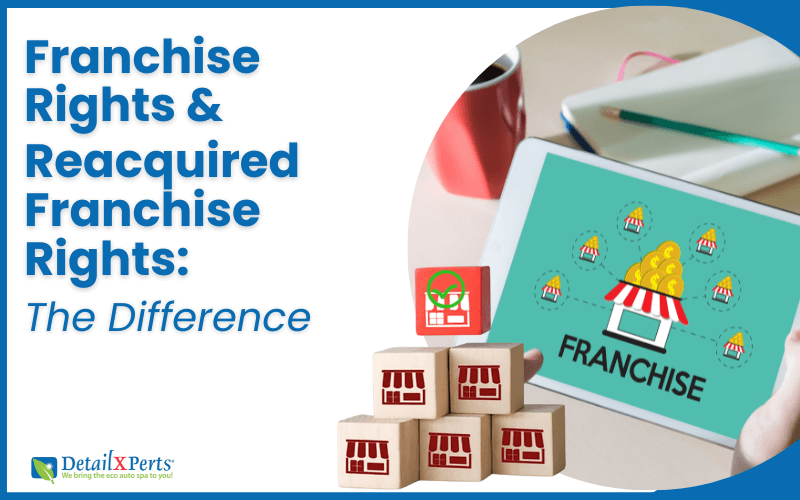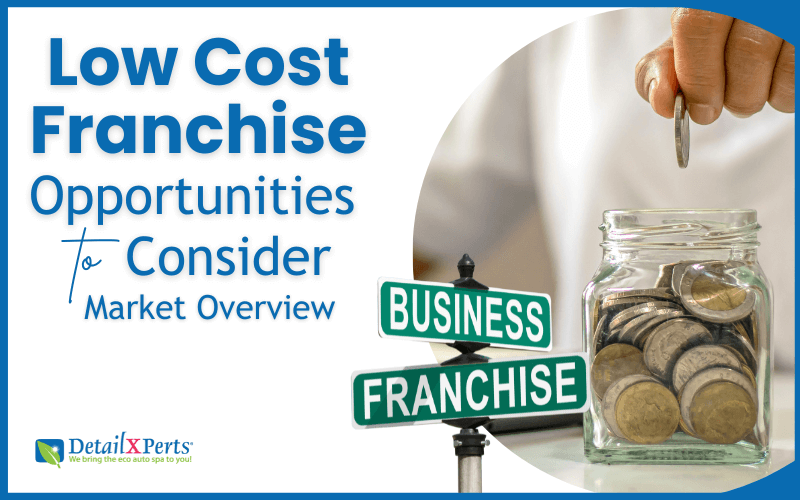Becoming a franchisee and investing in someone else’s brand name and business model means you need to know about franchise rights. Understanding what they are, how they work and what they mean for your future helps you make an informed decision before signing any legally binding paperwork. Equally important, it’s good to familiarize yourself with reacquired franchise rights in case your circumstances change after buying a franchise. Here’s what you need to know.
What Are Franchise Rights?
First, let’s get to the franchise rights meaning. When you invest in a franchise system, you’re paying for the opportunity to run a business using the franchisor’s brand name, systems, and proven franchise business model. These rights are outlined in the franchise agreement, which is the contract that explains what you can (and can’t) do as a franchisee. Basically, you’re getting a business-in-a-box but with terms and conditions attached.
Key Elements of Franchise Rights
Using the Franchisor’s Brand Name
You get to use the name, logo, and trademark of the business. Well-known brands give franchisees instant credibility and a built-in customer base. For example, imagine two car washes next to each other. One with a familiar, trusted brand name, and the other brand new and unknown. Most customers will naturally choose the one they recognize, giving you (the franchisee) a clear advantage right from the start.
The Franchise’s Business System
You’ll get a step-by-step process on how to run the business. This “blueprint” contains specific rules and regulations to follow. This is the tried-and-tested way of running the business, built from years of experience. Following the franchisor’s system helps you avoid the trial-and-error most startups face, making your launch smoother and less risky.
Access to the Operations Manual
The operations manual is your go-to guide for running your franchise. It lays out all the processes, standards, and specifications to make sure every location delivers a consistent, high-quality customer experience.
Most franchisors also require training so you’re fully prepared. For example, DetailXPerts’ business franchise format has comprehensive hands-on training and ongoing support to ensure you master their detailing systems and deliver excellent service from day one.
Marketing Materials
Benefits of franchising include tapping into its marketing machine. As a franchisee, you often get access to professional marketing materials like signs, posters, brochures, and social media templates.
Some franchisors collect a small percentage of each location’s revenue into a shared marketing fund for nationwide campaigns, while allowing local promotions, as long as they fit the brand image.
Proprietary Tools and Processes
Many franchises share their “secret sauce” with franchisees, whether it’s KFC’s cooking methods or a car rental company’s in-house booking system. This can also include special equipment, software, or technology that keeps you competitive.
For example, DetailXPerts provides you with patent-pending steam cleaning systems, eco-friendly products, and scheduling booking tools designed specifically for mobile detailing. These tools come with thorough training and ongoing support to help you deliver top-notch service every time.
Exclusive Territory
Most franchises protect their franchisees by granting an exclusive territory. This means you won’t have another franchise location from the same brand competing for your customers in your area. This is one of the key questions to ask franchisor.
For DetailXPerts, this could mean exclusive rights to serve a specific neighborhood or region with mobile car detailing services, helping you build strong local customer relationships without internal competition. The size of your territory varies, whether it’s a city, a suburb, or a set number of blocks, and is usually protected for the length of your contract, often 5 to 10 years.

Everything to Know About the Franchise
In the U.S., franchisors are required by law to give you a franchise disclosure document (FDD) before selling you a franchise. This important document gives you all the details you need to make an informed decision. For example, it covers:
- Legal history, including any litigation or bankruptcy involving the franchisor.
- Franchise fees and initial investment requirements.
- Obligations such as training and support.
- Details on renewal, termination, and transfers.
- Franchise tax.
- The franchisor’s financial performance (if provided).
The FDD is designed to protect both the franchisor and franchisee. You must review this document carefully, ideally with the help of a professional, like a lawyer or a franchise consultant. They can also talk you through a successor agreement or an area development agreement.
What Are Reacquired Franchise Rights?
By definition, “reacquired” means something is acquired again. In other words, if you reacquire the rights to something, you buy them back. In the business world, a franchisor can buy back a franchise from the franchisee (if the contract allows it). This process is called the reacquisition of franchise rights.
For example, in the automotive sector, mobile auto detailing companies like DetailXPerts or auto repair brands like Midas or Meineke sometimes buy back underperforming franchises. This can happen for several reasons:
- Protecting brand reputation.
- Restructuring operations to improve overall operations.
- Preparing to resell the franchise under new terms.
It sounds straightforward enough but unsurprisingly, the entire process comes with terms and conditions. So, you need to look at them closely. Furthermore, a third party can buy the franchise contract from a franchisee; it doesn’t necessarily have to be the franchisor. This is why it’s so important to understand your rights. Of course, this includes the buyback or transfer clause and how these rights impact the relationship between franchisor and franchisee.
Franchise Buy Back Clause
Some franchise agreements include a buyback provision. This gives the franchisor first rights to buy your franchise if you decide to sell or close. A buyback might happen if:
- You choose to exit the business.
- You decide not to renew your contract.
- You breach the agreement and the franchisor terminates it.
The buyback doesn’t just cover physical assets; it can also include intellectual property, proprietary systems, and your rights to the brand.
To sum up, franchise rights aren’t forever, and they’re not without strings. They last only for the term of your agreement, and they come with responsibilities, like paying fees, meeting performance standards, and following brand guidelines.
What’s the Deal with Buyback Provisions?
Be aware that the terms and conditions of a franchise agreement can vary between franchises. There is no “one-size-fits-all” document. Each franchisor has its way of doing things. However, the agreement must include termination policies, reacquired franchise rights, and exit strategies.
Resale policies vary, and there are good and not-so-good situations to consider. Some franchisors may have a “buyback” provision, which allows the franchisor to buy back the franchise. Often, the franchisor determines the rate for the buyback. Whether this rate is agreeable to the franchisee depends on the individual contract. It does, however, allow the franchisee to offload the business and move on with their life, which might make the agreed fee “worth” it.
What if There Is no Buyback Provision?
If there is no buyback provision, you may be free to sell your franchise to any qualified buyer, and possibly get a better price for the business. See franchise value.
However, some franchisors don’t allow the reselling of a franchise, no matter what. How do you feel about this? If you think it is too restrictive, consider partnering with franchisors who have buyback provisions in place.
Franchise Rights Vs. Reacquired Franchise Rights
As we’ve covered, franchise rights are the permissions you get when you join a franchise. The system is designed to give you a head start compared to starting a business from scratch.
Reacquired franchise rights are what happen when your franchisor regains the rights to the franchise, either because they’ve bought the business from you, the contract has ended, or you’ve agreed to transfer it. Simply put, franchise rights let you start the journey, and reacquired rights mark the point where you hand back control to the franchisor.
Selling Franchise Rights
If you’re excited about how to be a franchise owner, selling or transferring the business will be the last thing on your mind. But it’s wise to consider a “what if” situation in the future. What if you want to try your hand at another franchise business model? What if the franchising life simply isn’t for you? Or what if the business is not earning as you expected it to? Maybe you want to retire early.
As a franchisee, there may be countless “what ifs” down the line, but there is only one sensible solution: make sure the franchise agreement (a legally-binding document) supports an exit strategy that doesn’t result in a major legal or financial fall-out. It will benefit you if the reacquired rights and the transfer clause are fair and reasonable.
What Needs to Happen to Reacquire Franchise Rights
For a franchisor to reacquire franchise rights, certain conditions are usually met, as outlined in the franchise agreement. These often include:
- A buyback or termination clause that specifies when and how the franchisor can buy back the franchise.
- A required notice period where you inform the franchisor of your intent to exit.
- A valuation process to determine a fair price for the buy-back.
In some cases, the franchisee must express their intent to exit the business, triggering the franchisor’s right of first refusal.
Reacquisition might also occur due to the following:
- Lack of franchise growth or failure to meet contract terms.
- Breach of the franchise agreement.
- Mutual decision to end the contract.
Knowing these requirements upfront gives both you and the franchisor a clear, more manageable path through the process.
Reacquired Franchise Rights: Benefits and Drawbacks
There’s no standard form for franchise agreements, and the same goes for reacquired franchise rights. But the franchisor and franchisee will always have rights. That said, some contract clauses may favor one side more than the other. And it’s no different with reacquired rights. How it works depends on the specific contract and the situation. Here are pros and cons:
For the Franchisor: They can step in if a location is struggling, protect the brand’s reputation, or reorganize the network to keep everything running smoothly. This helps maintain high standards and consistency across the board, which benefits the entire franchise family.
Downside: While it’s a useful safeguard, reacquiring a location can also be costly and time-consuming. It means taking on the responsibility of running that site until a new owner comes along, which may not always be ideal.
For the franchisee: A buyback or reacquisition clause can sometimes be a blessing. If you’re ready to move on, it can offer a clear and straightforward exit route, especially if you want to avoid the hassle of finding your own buyer.
Downside: The same clause can also feel restrictive. You may have to sell back to the franchisor rather than a third party, maybe even at a lower price than you’d hoped. And in certain cases, it can feel a bit like a takeover, particularly if your business has lost value or you’ve already lined up another buyer.
As with any “rights”, there are conditions and protections put in place to promote certain values, such as fairness and respect. Good franchisors will be mindful of this. They would want the best for their franchisees. After all, a strong and healthy franchisor and franchisee relationship is key to building a successful business where both parties benefit.
When Do Reacquired Franchise Rights Matter?
Reacquired franchise rights matter the moment you decide you don’t want to be part of the franchise anymore. But the exit process isn’t as simple as selling up and moving on; there is the parent company to consider.
Often the franchise agreement requires you to:
- Offer the franchisor the first option to buy back the business before it’s sold to anyone else.
- Find someone to take over the contract. Bear in mind, the new franchisee must be approved by the franchisor.
Either way, getting out of a franchise business is a whole lot smoother if you know in advance what franchise laws are included in the franchise agreement.
Conclusion
To sum up the difference, franchise rights let you run the business, while reacquired rights are when those rights return to the franchisor. There is a lot to take on board, and the legal language of a reacquired franchise rights clause can be tricky unless you have a legal background. Therefore, it’s a good idea to get a professional opinion. For instance, get a franchise lawyer to go through the entire contract with you to make sure you fully understand what it involves before signing the contract.
If you’re seriously considering joining a franchise, take a look at DetailXPerts. We’ve built our business on clear communications, fairness and respect. So, no hidden clauses, no surprises when you partner with us. That’s because we believe a healthy and happy franchisor-franchisee relationship is the best foundation for success.
Download our business model overview, where we’ll introduce you to our gentle hand wash using steam cleaning technology.










